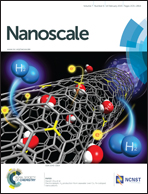The induction phenomenon and catalytic deactivation of thiolate-stabilized raspberry-like polymer composites coated with gold nanoparticles†
Abstract
Alkylthiolate ligands play dual roles in metal nanoparticles-coated polymer composite catalysts: stabilizer and deactivator. Herein, individual raspberry-like polymer composite spheres coated with gold nanoparticles were separated from each other in the presence of 6-mercaptohexanoic acid or 3-mercaptopropionic acid ligands. Effects of thiolate ligands on the induction time and the catalytic activity of such non-aggregated polymer composites were investigated experimentally and theoretically in the 4-nitrophenol/NaBH4 model reaction from the following aspects: ligand surface coverage, chain order and chain length. With the increase in alkylthiolate surface coverage and chain order on composite particles, the induction time increases first and then decreases, which can be explained based on spontaneous dynamic surface restructuring and electron injection from borohydride ions to the gold nanoparticle surface. The catalytic activity is compromised with the existence of thiolate ligands, but is enhanced with increasing alkylthiolate ligand coverage, which can be ascribed to sulfur-induced electronic charge depletion of the gold nanoparticles. The increment of CH2 in alkylthiolate chains results in the increase of induction time and the decrease of the catalytic activity, which can be attributed to the steric hindrance effect. The reactant addition sequence was also found to affect the induction time and the catalytic activity, which can be partially credited to NaBH4 reductant-induced desorption of thiolate ligands.


 Please wait while we load your content...
Please wait while we load your content...